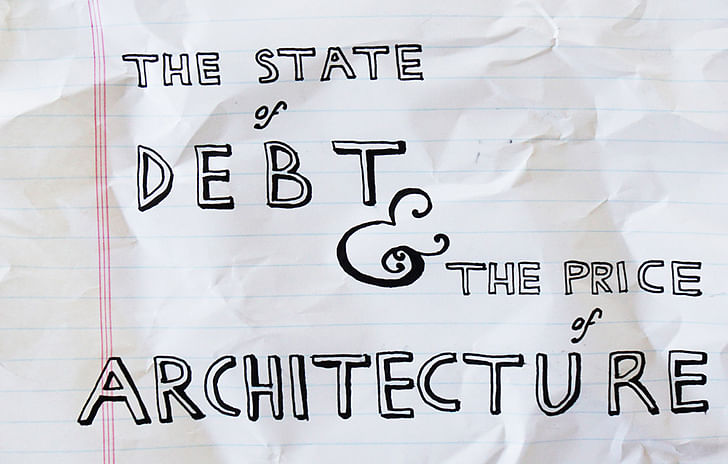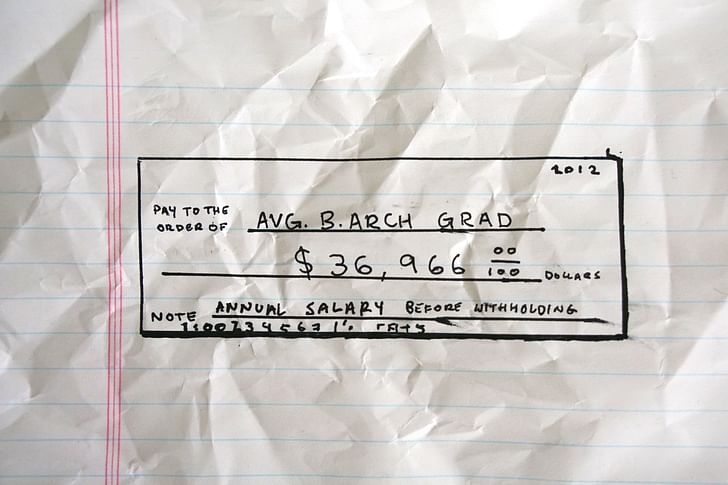

In the United States, around 40 million people currently hold student debt. This is a population that is greater than that of many countries. While, over the last 14 years, the average salary for young people has decreased by 10%, student debt has increased by nearly 500%. For most Americans, to become educated means to take on a relationship with banks that will last for years. But for young American architects the situation is even worse; the amount of schooling required to be able to practice professionally means taking on debt that you may be paying off for the rest of your life.
While the average student debt for a US American student is $29,400, according to a recent poll by the American Institute of Architecture Students, architecture students graduate with an average of $40,000 in loans. Not only does the profession require more time in school, architecture school is also a notoriously expensive academic experience. On average, an architecture student pays $1,117 annually on materials, which after being used to make a model are more often than not simply thrown away after crits (or in some cases, literally torn apart by a professor). Additionally, architecture students may be expected to pay for software licenses, computers, and, now, 3D prints.

Moreover, the professional field of architecture often puts extra burdens on its younger members, as if having to pay off monthly bills for the rest of one’s foreseeable future was not oppressive enough. A common cliche of architecture students is that they have so much work they have to sleep under their desks; they live and breathe their work. Meanwhile, students training in other fields are encouraged to take on part-time work to help alleviate their debt. Even medical students.
Some architecture firms may even solicit unpaid labor, often in the form of ‘internships.’ Like with other forms of exploitation, this has become a cycle perpetuated with the presumptive stance, “Since I did it, so should they.” Today, student debt is nothing short of a crisis. The problem with this logic, beyond being cruel and petty, is that it’s false. The issue is further convoluted by unclear labor laws and lack of effective regulation by architectural advisory boards. Student debt rises with tuitions, far outpacing salary increases. Couple that with changes to the global economy and a generally increasing cost of living, and the present strain of student debt stands in stark contrast to even a few decades ago. Today, it’s nothing short of a crisis.
Unless the situation changes, the current state of debt will inevitably have vast repercussions in the field of American architecture, particularly in contrast to counterparts in Europe, Canada and Asia where education is usually much cheaper, if not completely free (for example, Germany recently made all education completely free, even for international students). In an increasingly globalized field, architects trained outside of the United States simply have less to lose from experimenting with less financially-viable models. And experimentation is at the heart of architectural innovation.

Over the next few months, Archinect will gauge the price of becoming an architect today. Calling on an active community of architecture students (and some recent graduates), we sent out – and will continue to send out – anonymous questionnaires to learn about what its like to live with debt today. Statistics, while important, often obscure with averages and ignore those on the margins. Therefore, alongside numbers, we asked our respondents to open up about the lived experience of debt and the emotional responses it provokes. More often than not, those we interviewed admitted they tried not to think about their debt and rarely talked about it. But when they did they were often optimistic about their career choice despite the financial burden. For whatever reasons, the culture of today’s architecture community in the U.S. often places a taboo over frankly discussing debt. But debt is nothing to be shameful about; what is shameful is the propagation of the system that forces it upon young people.
As we continue this series, we would also like to use the space to showcase tips, strategies, and general ideas about how the architecture community can come together to change this situation. A good starting point is the AIA’s National Design Service Act Advocacy Tool Kit, which provides helpful information on legislative efforts to combat architecture student debt. If you have any other ideas, or know anyone who does, please let us know!

How old are you?
25
What's your nationality?
American
Where are you from?
Chicago, IL
Where are you currently enrolled and for what degree?
Graduated May 2014 with an M.Arch. II from Tulane University
What is your prior educational background?
BSAS from University of Illinois-Champaign Urbana
Do you have any debt that is not related to your architecture education?
No.
What is the total amount of debt you estimate that you will have after graduation? Actual amount: $98,906.81
Have you received financial support from your family? Approximately what proportion of your total expenses?
Undergraduate degree was financed by my parents with help from my grandparents and a scholarship (approx. $90k +living expenses), Master’s degree was financed myself and I received a scholarship ($32k total).
Are your parents cosignatories on any of your loans?
No.
Do you expect to be able to pay off your debt in the future? If so, when?
No, currently on the 25 year repayment plan with debt forgiveness.
Does the amount of debt you’ll have after graduation affect how you envision your career?
It affects when I think I might retire, not necessarily trajectory.
[Debt] affects when I think I might retire, not necessarily trajectory.
Will your debt affect decisions like, for example, being in a smaller firm versus a more corporate firm?
Yes. I opted for a more corporate environment to ensure a competitive salary and benefits and being able to work as much over time as I want or need to.
Have you considered alternative architectural business strategies or supplementary income to help bring down your debt?
I am open to alternate career paths but have not explored them and I cannot imagine having time or a life with a second job (and starting the ARE process).

How often do you think about your debt? How often do you talk about it with your friends, fellow students and/or family?
I think about it frequently however try not to constantly worry or discuss with others. Discussing the mountain of debt does not make it any smaller.
Does your debt scare you? Keep you up at night? Do you ignore it? Broadly speaking, can you describe the emotions you experience when thinking about your debt?
Thinking about the amount of debt I have is completely overwhelming. It is such a large number to me that I cannot really comprehend it, much less imagine paying it off on an architecture salary. I consciously try not to think about it so I’m not worrying about something that I don’t feel I can change in the foreseeable future. It does not affect how I function (losing sleep, severe stress) and I try to still go out and have fun (which means spending money).
I will certainly not be encouraging my kids, or anyone that asks me, to go into architecture.
Prior to studying architecture, were you familiar with typical architecture salaries? Do you think architects are underpaid?
I heard that architects “didn’t make a lot,” but being in high school wasn’t really aware what that meant (I had never had a budget or had to support myself, so what is a low salary?). I think architects are underpaid for the quantity and quality of work they do.
If you had known beforehand the amount of debt that your education would require for you to take on, would that have changed your decision to pursue architecture?
Perhaps if I fully understood the position I would be in now when I was 15... however that is impossible. I also can’t imagine what else I would have pursued.
Do you think the current state of debt in architecture will affect the field in the long term? How?
If people are aware of the financial situations of architects then maybe they will pursue something else and architecture will stop looking like such a glamorous field. I think in certain ways it is already affecting the field, there are more architecture graduates than professionals entering the field. I will certainly not be encouraging my kids, or anyone that asks me, to go into architecture.

How old are you?
27
What's your nationality?
American
Where are you from?
Kentucky
Where are you currently enrolled and for what degree?
Princeton University, M. Arch I
What is your prior educational background?
BA Architecture
Do you have any debt that is not related to your architecture education?
No
What is the total amount of debt you estimate that you will have after graduation?
Approximately $90,000.
Have you received financial support from your family? Approximately what proportion of your total expenses?
No
Are your parents cosignatories on any of your loans?
No
Do you expect to be able to pay off your debt in the future? If so, when?
Eventually, I expect it will take a while. Maybe 15-20 years.
Does the amount of debt you’ll have after graduation affect how you envision your career?
Yes, but I don’t feel that my expenses are unreasonable. It certainly was a concern in where I chose to go to graduate school. I didn’t want to take on more than $100k in debt.

Will your debt affect decisions like, for example, being in a smaller firm versus a more corporate firm?
I think debt affects many people’s decisions later on. When you’re deciding on a graduate school, people tell you to go the best school possible. Unfortunately, many of the “best schools” don’t offer much financial aid. Fortunately, I got lucky enough to receive a decent amount of funding; but still, I will come out $90k in debt because of the fact that I cannot afford to pay my rent and living expenses while in school without loans. Even for the best students with full scholarships, student loan debt can really add up. And that affects where you work afterwards, because architecture just doesn’t pay much. Personally, I hope I don’t have to make that decision.
Have you considered alternative architectural business strategies or supplementary income to help bring down your debt?
Yes, I’ve always planned to teach architecture. It’s the only means to a steady paycheck and some freedom to have your own office.
[Teaching] is the only means to a steady paycheck and some freedom to have your own office.
How often do you think about your debt? How often do you talk about it with your friends, fellow students and/or family?
I try not to think about it. When I do, I get overwhelmed. My parents still don’t know how much money I have borrowed for my education. While I have a very generous scholarship, the cost of living is killing me. I’ve never talked to my fellow students about debt. It’s somewhat taboo.
Does your debt scare you? Keep you up at night? Do you ignore it? Broadly speaking, can you describe the emotions you experience when thinking about your debt?
I ignore it. Or try to ignore it. I try to assure myself that it’s normal, most people aren’t able to afford to go to school by paying out of pocket. But it’s there, and it won’t go away, even if I were to declare bankruptcy.
Prior to studying architecture, were you familiar with typical architecture salaries? Do you think architects are underpaid?
I was unaware that architects make so little. Of course architects are underpaid, and the discipline is swamped with people. Today nobody needs an architect, it’s surprising we still have jobs.
If you had known beforehand the amount of debt that your education would require for you to take on, would that have changed your decision to pursue architecture?
Probably not. I guess I just like being poor. Even though I’m poor and probably will be for a while, architecture makes me feel fancy.
Do you think the current reality of debt in architecture will affect the field in the long term? How?
I think it’s a problem larger than architecture. It’s mostly an American problem. While we enjoy the best schools in the world that have a wealth of resources, we also pay the most for it. Europe pays little to nothing for their education. But most of my European friends aren’t happy with their education. It’s a difficult balance…. We can ask to pay less for our educations, but simple economics will dictate that we will be receiving less. At the same time, isn’t it unreasonable to think that some students graduate with $200,000 or more of debt? It’s a balance we should look for.

How old are you?
25
What's your nationality?
American
Where are you from?
Harrisburg, PA
Where are you currently enrolled and for what degree?
Graduated from Kent State University with Master of Architecture – 2013
Graduated from University of Cincinnati with Bachelor of Science in Arch - 2011
What is your prior educational background?
See above
Do you have any debt that is not related to your architecture education?
No
What is the total amount of debt you estimate that you will have after graduation?
$130,000
Have you received financial support from your family? Approximately what proportion of your total expenses?
Yes, about half
Are your parents cosignatories on any of your loans?
Yes
Do you expect to be able to pay off your debt in the future? If so, when?
Yes, hopefully not more than 15-20 years
Does the amount of debt you’ll have after graduation affect how you envision your career?
I’ve accepted that everyone who was not born into money will have student loan debt, regardless of profession, and it is just something you have to pay off while you progress through your career
Will your debt affect decisions like, for example, being in a smaller firm versus a more corporate firm?
No, I think the pay is relatively the same, I currently work for a very small firm
Have you considered alternative architectural business strategies or supplementary income to help bring down your debt?
Yes, I plan on “moonlighting” once I get my license
I think that in order to get paid well you have to be a standout, you need a higher level of design, higher class of clientele.
How often do you think about your debt? How often do you talk about it with your friends, fellow students and/or family?
I think it about it once a month when the bill comes, at this point it is not worth thinking about more than that, I just have to pay it.
Does your debt scare you? Keep you up at night? Do you ignore it? Broadly speaking, can you describe the emotions you experience when thinking about your debt?
Like I mentioned above, I don’t really think about it. It is daunting when you think about “wow I make $45,000 a year and my debt is like 3 times that” but currently there is nothing we can do so it’s not worth worrying about, just keep making payments.

Prior to studying architecture, were you familiar with typical architecture salaries? Do you think architects are underpaid?
I think that in order to get paid well you have to be a standout, you need a higher level of design, higher class of clientele. It is hard for many people to do this, which is why so many architects seem “underpaid.”
If you had known beforehand the amount of debt that your education would require for you to take on, would that have changed your decision to pursue architecture?
Probably yes, but I have always wanted to be an architect and the way I see it, I’ll be making enough money eventually in my career that my student loans will be paid off and I can live comfortably…because of the fact that I got a loan to get the proper education
Do you think the current reality of debt in architecture will affect the field in the long term? How?
It may make more people not want to pursue architecture or any degree that takes more than the average number of years to complete. I do not think that people who are passionate about architecture will be swayed by how much it costs to get there, though.
Writer and fake architect, among other feints. Principal at Adjustments Agency. Co-founder of Encyclopedia Inc. Get in touch: nicholas@archinect.com
61 Comments
quite honestly, i'm a bit envious of my friends who smoked weed all day and drank while I was slaving away in Arch school. Most of them are in better financial situations than most of my arch school friends. Most of them ended up in some union job, some office job, or some trade that raised them every few years...by the time I finished school most of them already had some seniority in their workplace. There is something wrong with the eduction system when school has a worse financial effect than bar hoping and getting high.
Great article, Nick (who I know from undergrad). Spurred a really good and really important conversation on how debt has created a culture of (secret) anxiety and a (feigned) obliviousness to debt among our generation. I don't believe that "kids these days" need to be better educated on what debt means. We all understand the function of money (below zero is bad), or at least, we will "get it" when that first notice of disbursement slaps us in the face.
I entered an M.Arch program with the impending fear of the debt I would accrue over seven (!!!) semesters, and got the hell out right when I saw that number hit four figures (three weeks in). I still cringe. I don't know how any student can be expected to perform at her or his best while under that kind of stress, let alone in the environment of architecture school.
My take away is that the pre-professional M.Arch should not exist, or rather, that it should not exist at the scale it does.
Another view on Germany's free tuition for all model, just FYI.
I’m trying to figure all of this out now. I’m finishing up my last year of my undergraduate degree. Luckily I was able to manage to work through school and get a few scholarships so I will finish my bachelors degree without debt. However my 4 year B.S. Arch degree from UNLV is not NAAB accredited and it was the only program in my state. So now in order to become licensed I need to get my masters degree which I will need to take loans out for. I’m terrified of this. I want to be an Architect but am worried that in order to stay on track for my career I will need to take out loans for my education that I’ll be paying back for the rest of my life. Will the education be a worthy investment? Even the cheapest graduate schools are at least 30k a year! And the problem is I can only go where I get accepted so I may not be able to go to a more affordable option. What should I do?
We need a union!
TFW you realize the AIA has never represented architects -- just the bloated real estate industry.
Block this user
Are you sure you want to block this user and hide all related comments throughout the site?
Archinect
This is your first comment on Archinect. Your comment will be visible once approved.